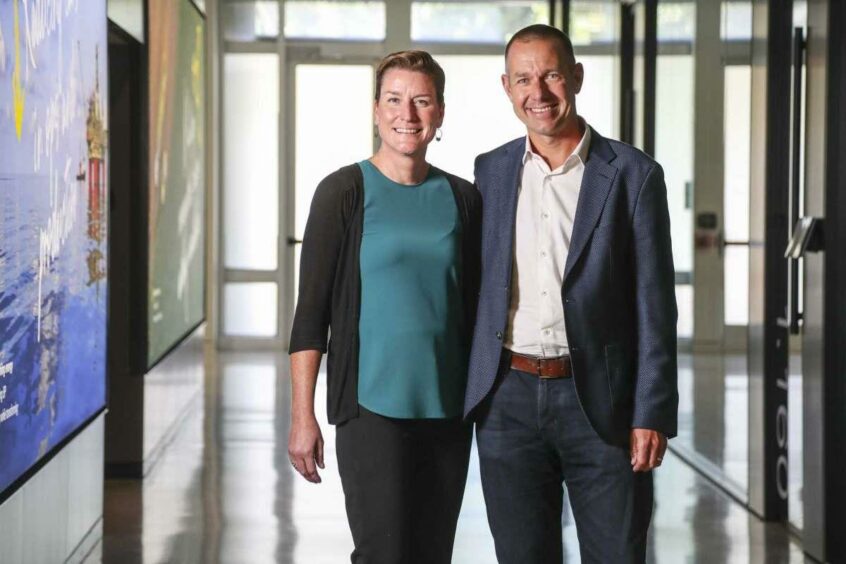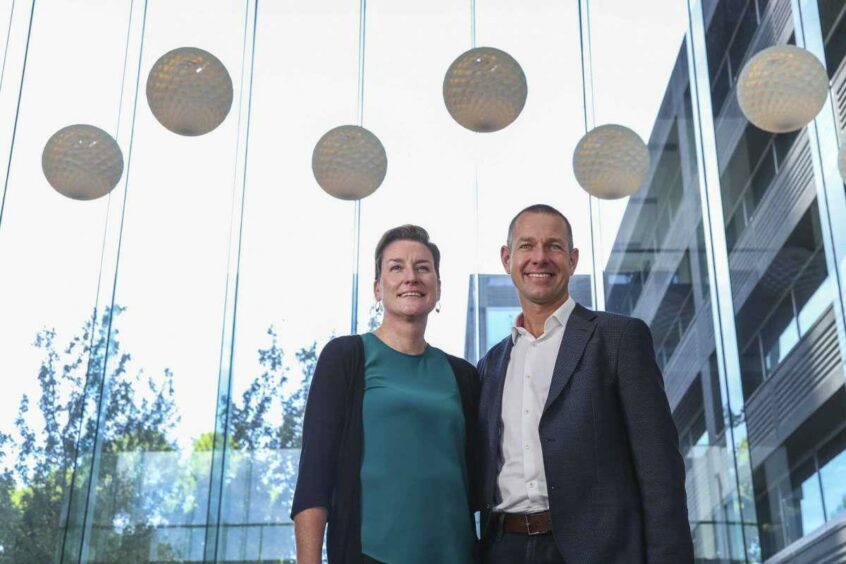
BP executives Starlee Sykes and Al Vickers have a lot in common as a married couple of seven years.
They both grew up from humble backgrounds: Sykes is the daughter of an insurance agent and a teacher; Vickers, the son of school principals. The Bellaire residents share their love of travel and cooking with their three boys: Jack, 17; Cade, 11; and Ethan, 4.
Professionally, though, Sykes and Vickers are on opposite sides of BP’s energy business.
Sykes, 46, is BP’s senior vice president for the Gulf of Mexico and Canada, overseeing the company’s offshore oil and natural gas operations. She hails from Texas, the biggest oil and gas-producing state in the world’s biggest oil and gas-producing country.
Vickers, 45, is chief executive of BP Wind Energy, overseeing the company’s nascent U.S. wind operations. He was born and raised in the United Kingdom, where there’s a great sense of urgency over the warming planet.
“It’s a great conversation starter,” Sykes said. “I joke sometimes that Al’s my carbon offset.”
Sykes and Vickers’ odd-couple relationship reflects the transition taking place at BP and the oil industry at large, a seismic shift with significant implications for Houston’s energy workforce. As more oil and gas workers pivot to wind and solar, Houston’s energy industry can expect to see more couples like Sykes and Vickers, said their longtime family friends Chris and Monica Del Campo.
“Al and Starlee are a really great story of how a difference doesn’t always have to be in conflict,” said Chris Del Campo, the principal mechanical engineer at oilfield services giant Schlumberger. “As more and more (oil and gas) people end up working on renewables, just by statistics, you’re going to start having more and more that happen to be living in the same house. Maybe their uniqueness is a sign of more things to come.”
Logical fit
Sykes and Vickers weren’t always on separate sides of the energy sector. They launched their careers in oil and gas when they joined BP after graduating from college in the late 1990s.
Sykes began as a mechanical engineer working on BP’s offshore projects. Vickers started as a chemical engineer in BP’s petrochemicals business, which was sold last year to INEOS for $5 billion in large part to fund BP’s clean energy initiatives.
Oil and gas was a logical fit for the two engineers.
Ever since Sykes was a little girl, the San Antonio native had a knack for mechanical things. As the fifth of six children, Sykes enjoyed taking things apart around the house and working on cars with her two older brothers.
She studied mechanical engineering at Texas A&M University, where she stood out as one of the few female engineering students in a male-dominated field. A summer internship with BP in Alaska introduced her to deepwater exploration and production, and she was hooked. After joining BP in 1997, Sykes climbed BP’s corporate ladder, growing the company’s deepwater division into one of the largest in the world.
Across the Atlantic, Vickers started on a similar career trajectory. After graduating from Manchester University, Vickers joined BP in 1998 as a chemical engineer. Vickers has worked in various oil and gas roles on five continents, including stints in South Korea, West Africa and the United States. He served as chief of staff of BP’s global upstream executive office, and was heavily involved in shaping and leading BP’s response and recovery from the Deepwater Horizon disaster in 2010.
They first crossed paths in 2007, during a job handover. Sykes, then in Houston, was moving to London to work at BP’s headquarters while Vickers was moving from London to work at BP’s Houston office. After getting each other up to speed on their respective roles, they didn’t speak again for five years.
In 2012, a mutual friend encouraged Sykes and Vickers to go to dinner because she thought they had a lot in common. Sykes was hesitant, but agreed to meet Vickers at Bentley’s Oyster Bar and Grill in London. They hit it off, and got married two years later at a Napa Valley winery. They settled down in Bellaire, and in 2017 had their son Ethan, who joined brothers Jack and Cade from Sykes’ previous marriage.
Making a transition
Three years ago, Sykes and Vickers’ energy disciplines diverged drastically.
The call came at 4:30 a.m. on Thanksgiving, 2018. Bernard Looney, a BP executive who would later become the company’s CEO, was on the other line in London, asking if Vickers was interested in overseeing the company’s small but growing wind business.
Vickers said he didn’t hesitate to jump at the opportunity.
“I’ve always liked to be at the front end of change. That’s always been interesting and energizing to me,” Vickers said. “This transition has been exciting because I think the world needs the transition that BP is going through. Being part of that is pretty cool.”
Sykes said she was supportive of Vickers’ new role in renewables.
“I really like to drive change and improvement on the inside,” Sykes said. “When I see things are not the way I think they should be, I don’t run. I do believe that we need to get to net-zero. I do believe we need to change as a planet. Being part of that solution by staying on the inside is actually really compelling to me.”
BP has moved aggressively for a lower-carbon future. The British company under Looney’s leadership in 2020 became the first oil major to set a net-zero carbon emissions target by 2050, and acknowledged that it would have to produce less oil in the coming decades to meet that goal.
The company plans to double its investment in low-carbon businesses such as wind and solar to between $3 billion and $4 billion a year by 2025, and to $5 billion a year by 2030. BP is on track to spend $2 billion this year on its low-carbon business, compared to $9 billion on its oil and gas business.
Economists at BP project that demand for crude, natural gas and coal could decline as much as 80 percent over the next three decades, while wind and solar expand rapidly, becoming as much as 60 percent of the global energy mix by 2050.
European oil majors are moving swiftly to shift investment from fossil fuels to renewable energy even as their American counterparts, Exxon Mobil and Chevron, continue to see a place for oil and gas, promoting technologies such as carbon capture that could keep fossil fuels viable in a low-carbon world.
Vickers, the Brit, and Sykes, the Texan, reflect this divergence — and uncertainty — as government and public pressure to combat climate change intensifies, said family friend Monica Del Campo.
“Starlee and Al’s roles within BP are indicative of the questions that all the supermajors are grappling with at this moment,” said Del Campo, a former environmental engineer now working in real estate. “Everyone’s trying to figure out what direction they really want to go in.”
BP is banking on revenues from Sykes’ oil and gas business to help grow Vickers’ wind business. The company is doubling down on the Gulf of Mexico, looking to extract low-cost, lower-emission crude that will help fund the company’s energy transition.
BP’s existing Gulf of Mexico fields can break even with crude prices in the low-$30s-a-barrel, making it some of the lowest-cost oil in the world to produce. Just as important, it can be produced with far lower carbon emissions since offshore oil platforms usually burn off less natural gas than onshore shale production.
A barrel of oil from the Mars oil field in the Gulf of Mexico has about half the carbon emissions of a barrel of oil from the Permian Basin in West Texas, according to an analysis by the energy pricing and research firm S&P Global Platts.
“Not all oil and gas is the same, I’d rather see investment going into good wind or good low-carbon energies,” Sykes said. “Knowing that there is the opportunity to put capital elsewhere actually helps me focus on the performance of my business.”
But to survive in the net-zero future, BP not only needs to replace the energy produced by oil and gas, but also the massive amounts of cash. That burden falls on Vickers, who is charged with growing the company’s profits from wind energy.
“We’re going to have to reallocate capital to create energy in the forms that customers and societies want,” Vickers said. “Starlee’s business may have a change in capital allocation, but I also know I’ve got a business to grow and that business is nowhere near the quantum of cash or earnings that Starlee’s business is today.”
Added challenge
Many Houston couples can find themselves at odds while juggling the demands of careers, household finances and children — demands that were amplified as life, work and school were confined inside homes during the pandemic.
Once, while Sykes was participating in a virtual panel discussion, Vickers came into their home office on the second floor of their Bellaire home, looking to print some documents. Not wanting to disrupt the presentation, he grabbed the printer to take downstairs, but inadvertently pulled the cables out and disconnected Sykes mid-speech.
“I cooked that night,” Vickers said, laughing. “And the next night and the next night.”
Sykes and Vickers have the added challenge of competing at work as they advocate for their respective department’s budgets, staff and stature within the company as BP navigates the energy transition.
“Yeah, everything is perfect,” Sykes said with a laugh. “There is tension, naturally. I think it’s a healthy tension, though.”
Sykes and Vickers are used to competition. They once were in the running for the same job overseeing offshore oil and gas operations in the Gulf of Mexico. When Vickers’ boss told him that he didn’t get the job, he asked who did.
“‘It’s going to be your wife,’” Vickers said he was told. “If I wasn’t going to get the job, I’d rather Starlee get it than some other dude. I can live with that.”
Ultimately, Sykes and Vickers agree the world can’t quit fossil fuels cold turkey. Crude is used in a variety of consumer goods, and natural gas is seen as an important bridge fuel for heating and power generation.
“Both Al and I believe we can’t have a quick disruptive transition,” Sykes said. “You can’t just turn off oil and gas today, given how much our world depends on it, and suddenly, everything will be green and perfect.”
Sykes and Vickers dismissed the notion that oil and gas and renewables are at odds with one another. They said the energy transition will require more collaboration from governments and energy companies.
“This is a massive replumbing of the world’s energy systems,” Vickers said. “If you’re going to do that and do it well, you need the smartest people in the world who’ve got proven capability and skills to solve big industrial problems. The quickest way to do that is to get the big companies, governments and educational institutions of the world pointed in the same direction and swimming together rather than swimming apart.”
This article first appeared on the Houston Chronicle – an Energy Voice content partner. For more from the Houston Chronicle click here.
 © Supplied by Karen Warren / Houst
© Supplied by Karen Warren / Houst